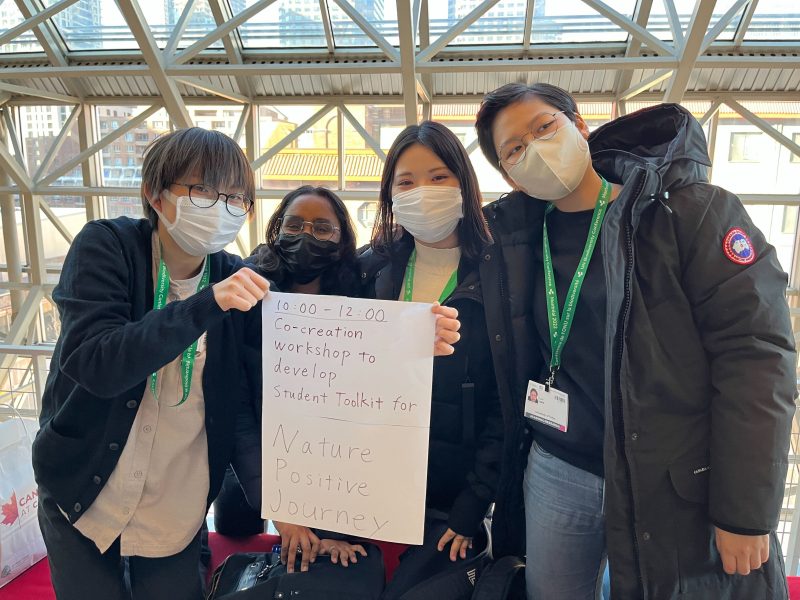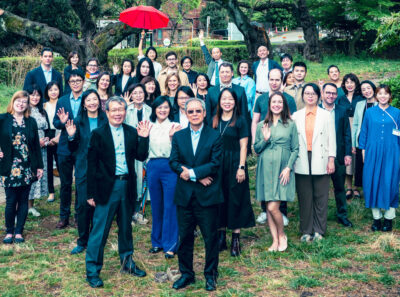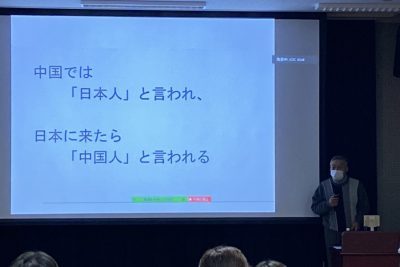Nature Positive Campuses

Author
Swetha SOUNDARARAJAN (3rd Year Undergraduate Student, Natural Sciences II, College of Arts and Sciences Senior Division, The University of Tokyo)
Students at the University of Tokyo were invited to co-organize the session “Opportunities for nature positive future – session for early-career scholars and students for the Fifth Science-Policy Forum for Biodiversity and the Eighth International Conference on Sustainability Science. The event was held on December 11-12th, 2022 as an official 2-day event of the UN Biodiversity Conference (COP 15) in Montreal, Canada. In this session, young researchers, along with undergraduate and graduate students, engaged in a discussion about rediscovering the value of biodiversity. This session aimed to inspire the next generation’s search for innovative solutions to work toward nature positive future.
As a result of student selections based on an open call at the University of Tokyo, Swetha SOUNDARARAJAN, Sora YAMAGUCHI, Leah HAN, and Suzuka IOKI, got an opportunity to design an activity and present in person at the conference in Montreal. The group was supervised by Dr. KOMATSUZAKI Shunsaku from GLP-GefIL and co-supervised by Dr. Marcin Jarzebski, Tokyo College.

Tokyo College: Congratulations on your successful participation in COP15. What was the COP15 about?
Swetha:
The COP15, which was held in Montreal on December 7 – 19, 2022, was of particular importance as it served as a forum to discuss post-2020 targets. These discussions were materialized as the Kunming-Montreal Global Biodiversity Framework. The Kunming-Montreal Global Biodiversity Framework has four overarching goals to be achieved by 2050 and a set of 23 targets to be reached by 2030. The mission of the framework for the period up to 2030 and working towards the 2050 vision of living in harmony with nature is to take urgent action to halt and reverse biodiversity loss, which means achieving a “nature positive” society.
Tokyo College: Why have you decided to join the COP15?
Swetha:
When we learned about this opportunity to join COP15, the first question we encountered was, ‘What can we, as students, do for biodiversity conservation?’ We realized that the best means would be to start with our university campuses. This is because university campuses are home to a wide community of naturalists, researchers, and young professionals and rich biodiversity serves as a living laboratory and is a hotspot for the discovery of new species. They are also a crucial component of urban green spaces. For instance, The University of Tokyo has 5 campuses, all situated at the heart of Tokyo, making biodiversity conservation in these campuses essential to achieving the national and global scale biodiversity targets. Finally, universities could also turn out to be a hub for citizen science. Campus biodiversity conservation has several positive impacts on students, too. To start with, the involvement of students in university scale management actions could enable them to scale up their experience to solve global biodiversity challenges along with enhancing a bottom-up approach in the universities’ biodiversity conservation measures. It can also nourish their relationship with the campus. Realizing the significance of students' role in campus biodiversity management, we decided to create a student toolkit.

Tokyo College: Why have you decided to create the toolkit?
Swetha:
As we were researching campus biodiversity, we came across Nature Positive Universities (NPU) (https://www.naturepositiveuniversities.net/)on social media that was calling on universities across the globe to join the alliance as founding members to reduce the negative impact on nature. NPU is a partnership between Oxford University, UNEP Youth & Education, and UN Decade on Ecosystem Restoration. It is a global network of people and universities working together to prioritize nature on campuses, in supply chains, and within cities and communities. NPU has been calling on universities around the world to sign the Nature Positive Pledge, a commitment to starting a nature positive journey, and is also working on creating a student activity toolkit that serves as a guide for activities geared toward nature positive universities. Surprised by our synchronized motives, we decided to proceed with co-creating the student toolkit that NPU has been working on.
Tokyo College: Could you tell me more about the process of developing the toolkit?
Swetha:
We started by joining as student ambassadors of NPU and discussed with the core team, student interns, and student ambassadors of Nature Positive Universities Alliance about the overall structure of the student toolkit. Simultaneously, we also interacted with other organizations like YESS (Young Ecosystem Services Specialists) and COND (Change Our Next Decade) to broaden our perspectives on this theme. Additionally, we conducted a couple of workshops with participants from different countries, to give a comprehensive and user-friendly structure to the toolkit. This was followed by presenting our findings at the COP15 session on December 12th. Finally, we presented our findings, output, and proposals for future actions, in the reporting session in February.
Tokyo College: How does the toolkit work?
Swetha:
For the toolkit, we proposed NPU to create a pdf and a website version of the toolkit with the pdf version focused on the four steps of the nature positive journey and the website version specifically for case studies of students' actions. The nature positive journey starts with assessing the baseline of the campus to get a concrete idea of the current status of biodiversity and plan optimal solutions. In the next step, this data is used to set SMART targets. The third step is to act and influence to achieve our targets and the fourth and final step is to officially report our actions. These four steps, along with how students can contribute to each of them will be briefed in the pdf version of the student toolkit. The website version focuses on the third step of act and influence and serves as a platform to surf case studies of students' actions in several universities. The users can also choose the level of action and filter the case studies under different categories like conservation hierarchy, area of action, global biodiversity targets, and more.

Tokyo College: You have become very engaged in the biodiversity actions on the campus. You are back from COP15 but it seems that is not the end. What are the next steps forward you would like to take?
Swetha:
After returning from Montreal, we started planning for our future course of action for the University of Tokyo campuses. We categorized our planned actions into creating a biodiversity audit, conducting a BioBlitz, and publishing a report. We started by joining iNaturalist, which is a platform to record and share the observed species in a specific area. Before the summer of 2023, we would like to create the audit and create land cover maps of the campuses with the help of faculty, student groups, and community groups. In the summer, we would also like to conduct a BioBlitz which is an event focused on finding and identifying as many species as possible in a specific area over a short period of time. We are planning to make effective use of iNaturalist for this event. This would be followed by creating a report of the biodiversity audit and our actions.
Tokyo College: After attending COP15, what is your message to UTokyo?
Swetha:
The COP15 session was a great trigger for us to act on an urgent but less noticed issue. Not only did it initiate our project but also highly motivated us to sustain it. We were astonished by the time the delegates spent on modifying the draft of the Global Biodiversity Framework that showed their commitment to seeing change. We wish a similar, stronger commitment could be seen at UTokyo. The nature positive journey has a huge potential to serve as a pillar, along with the race to zero campaign, to achieve the green transformation goals of UTokyo.
REFERENCES
WWF (2022) Living Planet Report 2022 – Building a naturepositive society. Almond, R.E.A., Grooten, M., Juffe Bignoli, D. & Petersen, T. (Eds). WWF, Gland, Switzerland.








